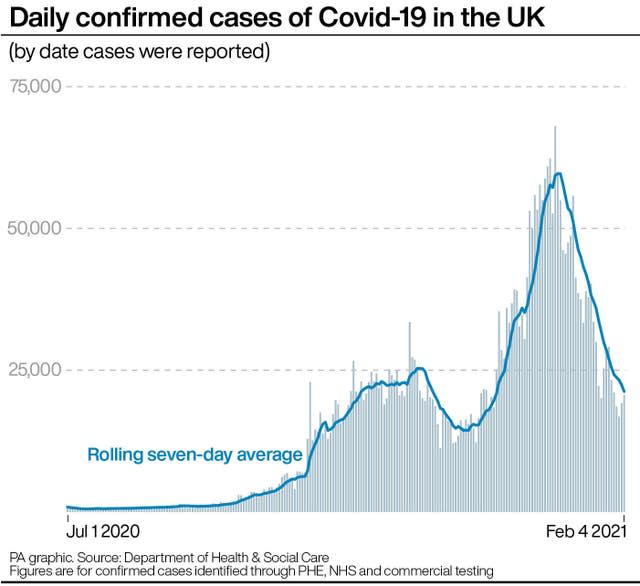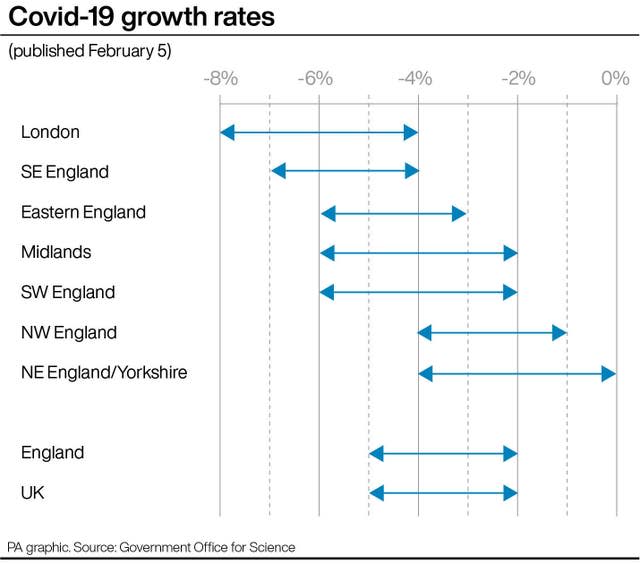Government races to book hotel rooms to quarantine travellers
Thousands of hotel rooms near airports are being booked by the Government as part of new quarantine rules for international arrivals.
The Department of Health and Social Care (DHSC) said it is working “at pace to secure the facilities we need”.
The requirement for travellers returning to the UK from “red list” countries to self-isolate in a Government-approved hotel for 10 days will be implemented from February 15.
This is among tougher border rules aimed at slowing the spread of new coronavirus strains.
Travellers staying at quarantine hotels will be asked to pay around £80 per night, an industry source told the BBC.
A commercial specification was issued on Thursday evening to hotels near air and sea ports asking for proposals on how they can support the delivery of quarantine facilities ahead of formal contracts being awarded.
The Daily Telegraph reported that the scheme will run until at least the end of March, with officials seeking to reserve 28,000 hotel rooms for use over that period.
The paper said that it had seen documents showing that an estimated 1,425 passengers will need to be accommodated each day, mostly near Heathrow.
Travellers will be given three meals a day via room service.
They will be required to take a coronavirus test on the second and eighth days of their stay, with a negative result needed in order for them to leave, according to the report.
The Government will pay around £55 million up front and try to recoup the money from passengers, the paper said.
The BBC reported that Government-approved security guards will be deployed inside and outside hotels.
Accor, which has hotels across the UK, including several near Heathrow Airport, said discussions with the Government are “well under way”.
A spokesman for the chain said: “We have had confirmation that managed quarantine facilities will come into effect from February 15 and we have received the commercial specifications for our hotels.
“Discussions are well under way with Government, and our hotels stand ready to support the Government’s call for quarantine in order to enable safe travel for Brits and essential international travel in these challenging Covid times, just as we have done in other countries.”

Abigail Tan, chief executive of the St Giles Hotel Group, said it can “quickly scale up our operations” to offer quarantine facilities.
She added: “We are ready to support the Government’s quarantine programme here at St Giles Heathrow, and do our part to allow for safe travel during these unprecedented times.”
Thistle Hotels also confirmed it has asked to be involved.
But the PA news agency understands that some hotels have asked to be excluded due to fears among catering and security staff about getting infected, and the impact on insurance policies.
For Labour, shadow home secretary Nick Thomas-Symonds said the Government was again doing “too little, too late”.
“It is beyond comprehension that these measures won’t even start until February 15,” he said.
“We are in a race against time to protect our borders against new Covid strains.
Going on holiday abroad is currently illegal.
You risk the lives of your family and friends.
Stay at Home.
Save Lives.
— Foreign, Commonwealth & Development Office (@FCDOGovUK) February 4, 2021
“Yet hotel quarantine will come into force more than 50 days after the South African strain was discovered.
“Even when these measures eventually begin, they will not go anywhere near far enough to be effective in preventing further variants.”
Adrian Ellis, chair of the Manchester Hospitality Association and general manager of the city’s Lowry Hotel, said the opportunity to open up for guests for quarantine purposes would be “welcomed” by some owners, but that details about plans were still scarce.
“We don’t know which hotels are assigned and we don’t know how the rules will work,” he told BBC Radio 4 Today.
Paul Charles, chief executive of travel consultancy The PC Agency, told the programme that quarantining travellers in hotels was not a “panacea for stopping Covid entering the UK”.
He said certain chains were concerned about their brand reputation being “tarnished” if they admit Covid-positive guests, and questioned the exit plan for “unwinding” hotel quarantines.

“Governments use these blunt tools and put these measures in place relatively quickly, although this has been very slow, but they have a habit of leaving them in place longer than is necessary,” he said.
“It would be much better for the anticipated £5 million up-front cost to be spent on investing in testing at arrivals and departures at Britain’s airports. That would have more impact.”
A DHSC spokesman said they had been in discussions with representatives of the aviation, maritime, hotel and hospitality industries, as well as counterparts in Australia and New Zealand which already have similar schemes.
“We are now working at pace to secure the facilities we need to roll out managed quarantine for British nationals returning home from the most high-risk countries,” the spokesman said.
“In the face of new variants, it is important that the Government continues to take the necessary steps to protect people and save lives.”


